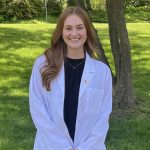Maya Klatsky Pursues Passion for Communication at Stony Brook

Maya Klatsky is in her second year of graduate studies in speech-language pathology at Stony Brook Southampton. Driven by a commitment to help individuals find their voices, she is turning her passion into a career that integrates science and human connection. “I have always been drawn to helping people express themselves,” Klatsky stated. “Communication is such an essential part of who we are, and when someone is unable to communicate effectively, it can be incredibly isolating.”
Klatsky’s journey into this field began during her undergraduate years at the University of Vermont, where she recognized the diverse populations that speech-language pathologists serve. “From children with developmental delays to adults recovering from strokes, the scope of the field is huge,” she explained. With a background in education, she began shadowing professionals in various settings, witnessing firsthand the transformative power of therapy on individuals’ confidence and connections.
Stony Brook Southampton was her choice for graduate studies due to its robust academic offerings, clinical training, and supportive community. “I liked the idea of a smaller campus and cohort size,” Klatsky noted. “It means more one-on-one time with faculty and supervisors. Everyone really gets to know each other, which is invaluable in a program that’s as intensive as this one.”
Experiential Learning and Supportive Environment
The campus, located near the scenic waters of Southampton, provides an environment conducive to studying and learning. “After a big exam, we take a break and walk to the beach and sit on the dock at the Southampton Marine Sciences Research Center. It is beautiful and grounding,” Klatsky shared. The layout of the campus enhances collaboration, with classrooms and labs in close proximity, allowing for seamless transitions between classes and clinical practice.
From the outset of her program, Klatsky engaged directly with clients under licensed supervision. She learned to conduct assessments, develop treatment plans, and monitor client progress. “The hands-on experience has been invaluable,” she remarked. “You can read about techniques in a textbook, but it is completely different when you are in a room with a client and adapting in the moment.”
During her externships, she discovered that therapy requires flexibility and creativity. “Every client is different,” she said. “You have to figure out what motivates them and how to make therapy engaging. It’s not a one-size-fits-all approach.”
This summer, Klatsky volunteered at Camp Dream.Speak.Live, a program for children who stutter, organized by faculty and students at Stony Brook Southampton. “It was amazing to see how the kids supported each other,” she remarked. The camp provided a safe space for children to share their experiences, reinforcing the emotional aspects of communication disorders.
Future Aspirations and Advice for Prospective Students
Klatsky’s experiences have solidified her desire to work in a medical setting, such as a hospital or rehabilitation center, addressing diverse speech, language, cognitive, and swallowing disorders. Her externship at the Long Island State Veterans Home allowed her to connect with residents and their families, providing impactful care. “One wife told me, ‘I don’t think you realize how much of an impact you’ve made on him,’” Klatsky recounted. “The fact that I can help give them this time back is just an amazing feeling.”
For her upcoming fall placement, she will work with children in an elementary school setting. “I like the variety that comes with this field. You can work with so many different populations and in so many different settings. It keeps things interesting,” she said.
Klatsky encourages prospective students to seek early observation or volunteering opportunities. “The more you can see what the field is really like, the better,” she advised. She emphasizes that strong interpersonal skills are crucial in this profession. “A big part of our work is listening, being patient, and finding creative ways to connect with people,” she added.
Her journey in speech-language pathology has also highlighted the importance of advocacy and education. “Sometimes part of the job is educating others,” Klatsky explained. “You’re not just treating the client; you’re building a whole support network around them.”
For Klatsky, this work transcends speech improvement. “At the end of the day, it’s about helping someone communicate in a way that lets them fully participate in their life,” she concluded. “That’s what keeps me motivated.”






